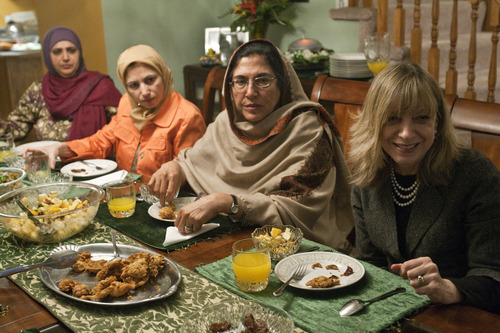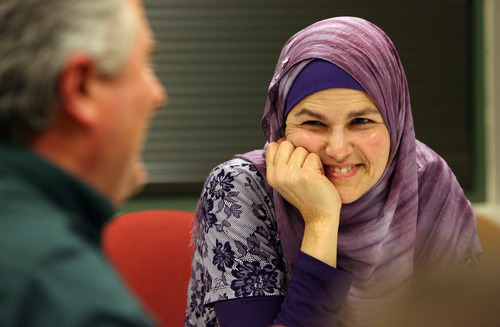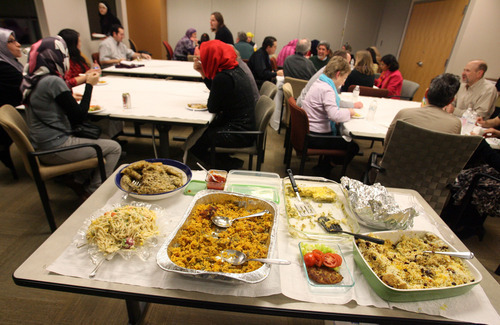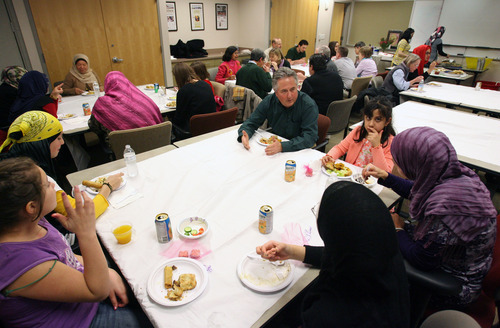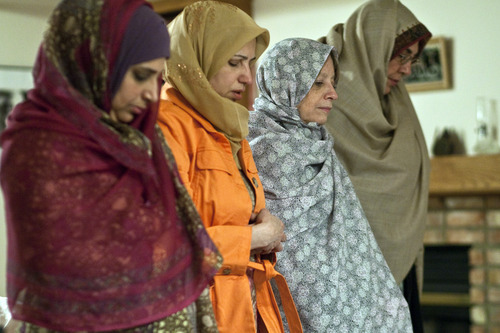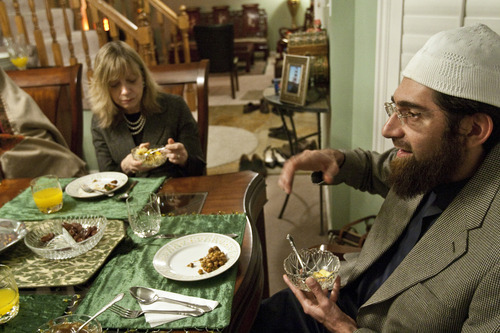This is an archived article that was published on sltrib.com in 2012, and information in the article may be outdated. It is provided only for personal research purposes and may not be reprinted.
My personalized Ramadan experiment ended this week, and people keep asking me if I'm happy it's over. They congratulate me for the ability to forgo eating and drinking during daylight hours for 31 days and ask me if I've lost weight (yes, thank you, about 7 pounds). They either remark on my stamina or joke about my lunacy.
I confess I have missed lunching with friends and sipping on bottles of water at my desk.
Overall, though, I'm sad it's done. January was a sacred time for me; now I have been dropped back into the ordinary world. The experience transformed my habits, my thinking, my approach to journalism, my marriage and, most important, my heart.
You see, the Muslim yearly practice of Ramadan is about so much more than fasting. It is coupled with praying five times a day, reading the Quran, doing good deeds, giving to the poor and controlling negative thoughts and actions. Any angry exchanges, crankiness, complaining, lying, cheating, gossiping or hurting others undoes all the good accomplished by the fast.
It provides a whole calculus to change bad habits (broke my dependence on caffeine) and eliminate mean thoughts (still working on that), while improving self-discipline and generosity.
So here's my self-assessed report card:
Fasting • A- (had a sip of water on two occasions when taking headache medicine — also against the rules — and I cheated a few times with Altoids; didn't want co-workers and family members to suffer from my bad breath).
Praying • A- (didn't always hit the exact times but only missed a couple of prayers throughout the month).
Quran reading • C+ (only made it halfway through, but I enjoyed it; that should count for something, right?).
Good deeds • B- (a lot fewer than I planned but more than usual).
Giving alms • B+ (finally gave to some of the groups I've been intending to for months).
Controlling negative emotions • A, 100 percent! (a couple of close calls, but not a single fight with my husband or kids).
The no-anger miracle reminded me of a time in 1992 when we were told that our baby daughter Camille would probably not live a week. She had a severe and inoperable heart defect and required round-the-clock care from the moment of her birth. She couldn't eat much at a time so had to be fed every couple of hours all night long.
I made a deal with God: Keep her alive and you will never hear me complain about sleepless nights or juggling a full-time job and home. Then the magic happened: I never even felt like complaining and she lived two years.
The same phenomenon occurred this month. I promised I wouldn't get angry and, through some spiritual alchemy, I didn't have to work at controlling my anger. I didn't even feel it.
On Tuesday night, I was invited to dinner at the lovely home of Noor and Masood Ul-Hasan, longtime friends, who agreed to show me how Muslims break their fast. They invited two other couples and Muhammed Mehtar, the imam (leader) at the Khadeeja Islamic Center in West Valley City, to dine and pray with me and my husband.
"Oh, my God, for you have I fasted," the imam said at the meal's opening. "To you, I give my full belief."
We began with appetizers, including traditional dates and other scrumptious dishes, then retired to the basement for prayers. I donned a head scarf out of respect and followed the others in the bowing and prostrating. The imam led the prayers in Arabic, then later explained them in English.
Essentially, Mehtar said, every prayer repeats the idea that God is greater than everything else — work, school, even family. If we follow God, he said, all other aspects of our lives will be better.
We then had an extensive feast of lamb, beef, chicken, lentils, potato pancakes, naan and many more dishes — I don't know how Muslims could break their fast with such rich food every night and not gain weight — and talked about the faith and various cultural traditions that go along with it.
"We thank you for feeding us. We thank you for quenching us," the imam prayed at the end of the meal. "We thank you for making us amongst the believers."
On Wednesday, more than 30 Muslims from around the valley joined me and my editors in a kind of Eid, the celebration that typically follows Ramadan. They brought the food and shared with us stories of how they came to be in Utah from so many countries. They told me that they practice elements of their holy fast throughout the year.
"Ramadan is like the spiritual Olympics," Nichole Mossalam told me at the event. "You can't go into it on a dead run. You have to train for it."
Because their Eid is a lot like Christmas, several Muslims gave me small and precious gifts, and they painted my arm with henna. It moved and humbled me. I understand now how their system programs such kindness and hospitality into them.
This month, I have come to measure my life by the sun in new and dramatic ways, watching from my study window as the sun comes up over Mount Olympus, seeing its pinks turn red and then back again. I have been thrilled by the sunset, feeling joy and gratitude as it signals the end of my fast. I have thought more consciously about the impact of my actions on others and calculated my daily credits and demerits, hoping to keep myself on the plus side.
I intend to continue daily prayers — they have given me a rhythm to my days the way the sabbath gives a rhythm to my week. I will finish the Quran before the real Ramadan, which begins this year in July. I hope to maintain my emotional equilibrium, now realizing how many of the arguments with my husband were my fault. I plan to fast once a week (the Prophet Muhammad did it twice a week) and try the full program every January (next year my husband said he would do it with me). Never again will I write about Ramadan as if it were merely an exercise in starving.
Years ago, my mantra was "always a little hungry." By that I meant, I hoped I would never get so self-satisfied and comfortable that I didn't hunger for more learning, giving and loving. It took this experience to remind me of that.
When I told my friend Maysa Kergaye, who has been my Muslim spiritual guide, that I was sorry to be ending my month, I could almost see her slow smile through the phone.
Now, she said, you know how we feel. And now I know what to feel.
More on the Web
O Read previous stories from Peggy Fletcher Stack's Ramadan quest at › http://www.sltrib.com.


